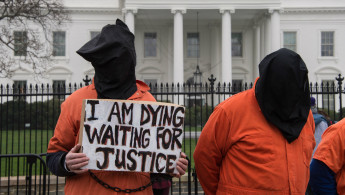US releases report detailing Guantanamo detainees' backgrounds
Following a lengthy tug-of-war with Capitol Hill, the Pentagon has given a senator the first-ever, unclassified report detailing the suspected militant backgrounds of more than 100 detainees at or recently released from the US military prison at Guantanamo Bay – a report that will likely spur more debate over shutting it down.
The report, given to Senator Kelly Ayotte, who shared it with AP, tells the story of detainees like Karim Bostan, who once ran a flower shop and later was accused of running an al-Qaeda affiliated explosives cell believed to have targeted US-led coalition forces in eastern Afghanistan.
Bostan had been at Guantanamo for more than 13 years but has been cleared for transfer to a country willing to accept him.
"While the Department of Defence watered down information and failed to provide key details regarding some detainees, the report still provides Americans with a consolidated, unclassified source of information regarding the dangerous terrorists at Guantanamo who the administration has recently released or plans to release soon," Ayotte said in an email response to questions.
She has pushed the Obama administration for years to be more transparent about who is being transferred out.
 |
| Senator Kelly Ayotte pushed the Obama administration for years to be more transparent about who is being transferred out [Getty] |
The remaining detainees "will no doubt" return to the fight once released, she said, noting that the Defence Department told her that 93 percent of the detainees still at Guantanamo as of late last year were high risk for re-engagement in terrorism.
The report, however, also tells the stories of low-level militants released after being detained for more than a dozen years without charge – cases that support those who have long argued that indefinite detention runs counter to US values.
In that category, there's Muhammad Said Salim Bin Salman, a Yemeni who travelled to Afghanistan to train at an al-Qaeda camp.
He says he became a cook and never fought because he suffers from back pain. Deemed a medium intelligence risk, he was cleared for release and transferred to Oman in January following 14 years of detention.
David Remes, a human rights lawyer who represents several detainees, says dangerous men are not being released.
 |
Holding the men at all was a deep injustice and a lasting stain on the US. These men shouldn't have been in Guantanamo in the first place - David Remes, a human rights lawyer |
 |
"Holding the men at all was a deep injustice and a lasting stain on the US. These men shouldn't have been in Guantanamo in the first place," Remes said, "It's one thing to prosecute detainees for attacks on the US... It is quite another thing – and contrary to the values the US says it is committed to –hold men for many years, who are accused of no crime."
The Office of the Director of National Intelligence reports that 5 percent of Guantanamo prisoners released since President Barack Obama took office have re-engaged in militant activities and another 8 percent are suspected of it. That compares to 21 percent confirmed and 14 percent suspected during the Bush administration.
The US military prison in Cuba held about 240 detainees at Guantanamo in 2009. So far, Obama has transferred 162 detainees to other countries.
The report given to Ayotte covers 107 detainees who were at the prison as of 25 November 2015, the day Obama signed the 2016 defence policy bill that required the report. The current population is 76.
Republican lawmakers accuse Obama of rushing to downgrade detainees' threat status to clear them for transfer so he can make good on his campaign pledge to close the prison before he leaves office in January.
 |
The US military prison in Cuba held about 240 detainees at Guantanamo in 2009. So far, Obama has transferred 162 detainees to other countries. |  |
Myles Caggins III, a spokesman for the National Security Council at the White House, declined to predict whether Obama will achieve his goal, but said the US continues to work with countries willing to receive the 34 detainees – nearly half the remaining prison population – who have been cleared for transfer.
The GOP-led Congress has tried to slow or stop detainees from being transferred out and has banned any from being moved to US prisons.
The dispute between the White House and Republicans in Congress got especially heated this spring when Paul Lewis, the Pentagon's special envoy for closing Guantanamo, told a congressional committee that Americans have been killed by detainees released from Guantanamo.
Lewis did not say how many or offer any other details. Amid the debate, Ayotte has been working for months to get the Pentagon to deliver the unclassified report required by the defence bill.
The Pentagon had until 24 January to send it to Congress. Defence officials missed that deadline.
In response, Ayotte blocked a nomination vote on the Defence Department's pick for general counsel. She released her hold when the report was delivered to her office on June 13. The Pentagon has not shared it with the Armed Services Committee, as the law requires.
While some unclassified information about Guantanamo detainees can be found in hundreds of government documents, news stories, court files and detainee threat assessments leaked by Wikileaks, the Pentagon has never compiled it in a single, unclassified report for lawmakers, or the public, to peruse.

![Palestinians mourned the victims of an Israeli strike on Deir al-Balah [Getty]](/sites/default/files/styles/image_684x385/public/2024-11/GettyImages-2182362043.jpg?h=199d8c1f&itok=xSHZFbmc)


![The law could be enforced against teachers without prior notice [Getty]](/sites/default/files/styles/image_684x385/public/2178740715.jpeg?h=a5f2f23a&itok=hnqrCS4x)
 Follow the Middle East's top stories in English at The New Arab on Google News
Follow the Middle East's top stories in English at The New Arab on Google News


